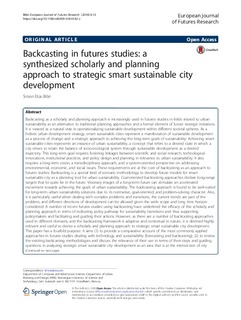| dc.contributor.author | Bibri, Simon Elias | |
| dc.date.accessioned | 2019-01-30T10:11:25Z | |
| dc.date.available | 2019-01-30T10:11:25Z | |
| dc.date.created | 2018-06-19T18:28:41Z | |
| dc.date.issued | 2018 | |
| dc.identifier.citation | European Journal of Futures Research. 2018, 6 (13), 1-27. | nb_NO |
| dc.identifier.issn | 2195-4194 | |
| dc.identifier.uri | http://hdl.handle.net/11250/2583033 | |
| dc.description.abstract | Backcasting as a scholarly and planning approach is increasingly used in futures studies in fields related to urban sustainability as an alternative to traditional planning approaches and a formal element of future strategic initiatives. It is viewed as a natural step in operationalizing sustainable development within different societal spheres. As a holistic urban development strategy, smart sustainable cities represent a manifestation of sustainable development as a process of change and a strategic approach to achieving the long-term goals of sustainability. Achieving smart sustainable cities represents an instance of urban sustainability, a concept that refers to a desired state in which a city strives to retain the balance of socio-ecological system through sustainable development as a desired trajectory. This long-term goal requires fostering linkages between scientific and social research, technological innovations, institutional practices, and policy design and planning in relevance to urban sustainability. It also requires a long-term vision, a transdisciplinary approach, and a system-oriented perspective on addressing environmental, economic, and social issues. These requirements are at the core of backcasting as an approach to futures studies. Backcasting is a special kind of scenario methodology to develop future models for smart sustainable city as a planning tool for urban sustainability. Goal-oriented backcasting approaches declare long-range targets that lie quite far in the future. Visionary images of a long-term future can stimulate an accelerated movement towards achieving the goals of urban sustainability. The backcasting approach is found to be well-suited for long-term urban sustainability solutions due to its normative, goal-oriented, and problem-solving character. Also, it is particularly useful when dealing with complex problems and transitions, the current trends are part of the problem, and different directions of development can be allowed given the wide scope and long time horizon considered. A number of recent futures studies using backcasting have underlined the efficacy of this scholarly and planning approach in terms of indicating policy pathway for sustainability transitions and thus supporting policymakers and facilitating and guiding their actions. However, as there are a number of backcasting approaches used in different domains, and the backcasting framework is adaptive and contextual in nature, it is deemed highly relevant and useful to devise a scholarly and planning approach to strategic smart sustainable city development. This paper has a fourfold purpose. It aims (1) to provide a comparative account of the most commonly applied approaches in futures studies dealing with technology and sustainability (forecasting and backcasting); (2) to review the existing backcasting methodologies and discuss the relevance of their use in terms of their steps and guiding questions in analyzing strategic smart sustainable city development as an area that is at the intersection of city development, sustainable development, and technology development; (3) to synthesize a backcasting approach based on the outcome of the review and discussion; and (4) to examine backcasting as a scholarly methodology and planning approach by looking at its use in the Gothenburg 2050 Project, as well as to use this case to illustrate the core of the synthesized approach. The synthesized scholarly and planning approach serves to help researchers and scholars in analyzing strategic smart sustainable city development to assist planners, policymakers, and decision-makers in their endeavor to implement smart sustainable cities. | nb_NO |
| dc.language.iso | eng | nb_NO |
| dc.publisher | SpringerOpen | nb_NO |
| dc.rights | Navngivelse 4.0 Internasjonal | * |
| dc.rights.uri | http://creativecommons.org/licenses/by/4.0/deed.no | * |
| dc.title | Backcasting in futures studies: a synthesized scholarly and planning approach to strategic smart sustainable city development | nb_NO |
| dc.title.alternative | Backcasting in futures studies: a synthesized scholarly and planning approach to strategic smart sustainable city development | nb_NO |
| dc.type | Journal article | nb_NO |
| dc.type | Peer reviewed | nb_NO |
| dc.description.version | publishedVersion | nb_NO |
| dc.source.pagenumber | 1-27 | nb_NO |
| dc.source.volume | 6 | nb_NO |
| dc.source.journal | European Journal of Futures Research | nb_NO |
| dc.source.issue | 13 | nb_NO |
| dc.identifier.doi | 10.1186/s40309-018-0142-z | |
| dc.identifier.cristin | 1592453 | |
| dc.description.localcode | © The Author(s). 2018 Open Access This article is distributed under the terms of the Creative Commons Attribution 4.0 International License (http://creativecommons.org/licenses/by/4.0/), | nb_NO |
| cristin.unitcode | 194,63,10,0 | |
| cristin.unitname | Institutt for datateknologi og informatikk | |
| cristin.ispublished | true | |
| cristin.fulltext | original | |
| cristin.qualitycode | 1 | |

